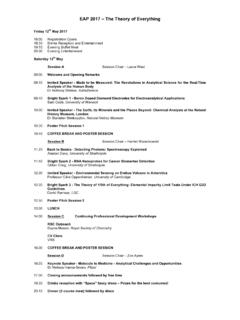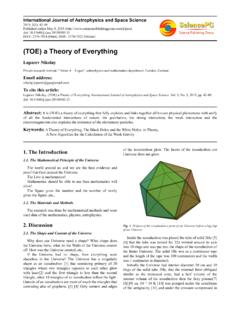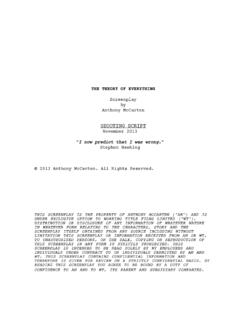Transcription of Theory of Everything Transcript - Quantum Spot Academy
1 Theory of Everything Transcript does the world work? What is the nature of reality? What are the ultimate governing principles of the universe? These are the foundational questions of physics that continue to fascinate and challenge us. Humans have come a long way on our quest to understand the world we live in. But the search is still on to find the ultimate answer, the single unified model that incorporates all of our knowledge of physics a Theory of Theory of Everything is the holy grail of physics, the Theory of all theories, the universe in a nutshell. But what exactly is a Theory of Everything ? How close are we to developing a single unified Theory , and what will happen after we ve finally found it? These are challenging questions that help us to probe the nature of s start by thinking about what a Theory of Everything really is.
2 In short, it s a single Theory that describes how the universe works. At least in principle, a Theory of Everything explains all that there is to know about the fundamental mechanisms of physics. A Theory of Everything is the gold standard of reductionism the idea that all of the complexity in the world can be reduced to simple underlying foundations. It might seem paradoxical that Everything in the entire universe could be encapsulated by a single Theory . Is it really possible to describe the entire universe on the back of an envelope? Well, yes and no. To understand what a Theory of Everything actually is, we need to explore the idea of is the word we use to describe how complexity emerges from simple rules. This is a very abstract and nuanced concept that s central to the doctrine of reductionism. For example, the game of chess has some very simple rules; the playing pieces only have a few very basic moves.
3 And yet chess is a game of seemingly infinite complexity. There are so many possible strategies and tactics in chess that all emerge from the basic rules of movement governing the game. The rules of chess don t list all of the possible arrangements of pieces on the board; they simply dictate the possible movements of different pieces on the board, and all of the game s complexity is an emergent of 16 2015 Quantum Spot Academy All rights , a Theory of Everything doesn t catalogue the exact position of every single particle in the universe. But it does tell us the rules of the game, so to speak. A Theory of Everything describes how the universe works in the most fundamental sense. So having a Theory of Everything won t mean that we know all that there is to know instead, it s a kind of boiled-down description of the truly essential and universal principles of reality.
4 So how do we go about developing a Theory of Everything ? What are the distinguishing qualities that a Theory of Everything must have?Well, above all, a Theory of Everything has to meet the basic requirements of any Theory . After all, if it s not a Theory of anything, it certainly can t be a Theory of Everything . So what does it take to make a Theory and how do we know if it s true?In physics, a Theory is a tool that we can use to make predictions. We can test our theories by performing experiments. For example, let s say I want to develop a simple Theory of gravity. I notice that things fall when I drop them, and so my Theory predicts that if I drop something, it will fall. Now I can perform an experiment to test my Theory . I am going to drop an apple. If my Theory is true, then the apple should fall. Sure enough, that s exactly what happens!
5 But that doesn t necessarily mean that my Theory is true. After all, maybe apples fall, but bananas don t. Maybe things only fall on Wednesdays. I would have to perform more experiments to be sure. This type of extensive testing often reveals flaws in a Theory . For example, if I try dropping a helium balloon, it won t fall as I had predicted; instead it will float away into the sky. That means that although my Theory is very useful for certain circumstances, it sometimes makes incorrect process has repeated itself countless times in the history of physics. Many of the greatest discoveries have emerged out of the realization that our observations don t match our predictions. For example, the Theory of Quantum mechanics was developed in an attempt to explain the surprising results of many experiments including a particularly famous one called the double slit experiment, in which light can be seen to act as both a particle and a wave.
6 In this sense, Quantum mechanics was developed as a response to what physicists saw in the real , however, theories aren t inspired by physical events. New theories can also be created based off of previous theories. For example, Albert Einstein realized that the theories of electromagnetism and relative motion were in conflict. His Theory of special relativity effectively resolved this conflict. Instead of doing laboratory experiments, Einstein did thought experiments, imagining what what it would be like to travel near the speed of of 26 2015 Quantum Spot Academy All rights a Theory has been formulated, it needs to stand up to rigorous experimental testing before it can be generally accepted. Now, there are a few important caveats to this point. First of all, any experiment that we perform will have some amount of error in it.
7 We can t test our theories with absolute precision. And even if we could perform infinitely accurate experiments, you could still make the argument that we will never be able to prove a Theory to be true. It s always possible that a new experiment will prove the Theory false, just as the balloon did away with my simple Theory of gravity. But, by performing a large number of experiments under different circumstances and conditions, we can become very confident with the accuracy of our theories. Nevertheless, it s certainly a tall order for a Theory to be completely accurate, since it only takes a single contradictory experiment to forever prove it in addition to being accurate, a Theory of Everything also has to be all-encompassing it needs to explain every single phenomenon in the universe. My Theory of gravity was excellent for predicting what will happen if I drop an object, but it doesn t explain why magnets attract or what atoms are made of; I need to develop separate theories to describe those phenomena.
8 A Theory of Everything , however, would, by its very definition, explain Everything that we observe. Right now, we have a lot of theories that are excellent for predicting the behaviors of certain things, but we don t yet have a single Theory that explains this end, a general theme in the history of physics has been unification. Time and time again, physicists have been able to unify relatively specialized theories into more general ones. For example, Isaac Newton unified the Theory of falling bodies and the Theory of planetary orbits. He realized that these seemingly different concepts could be modeled with a single Theory of gravity. Similarly, James Clerk Maxwell incorporated the electric force and the magnetic force into a unified Theory of the electromagnetic force. A Theory of Everything would effectively unify all of our theories into a single all-encompassing model of the when that happens, when the inner workings of the cosmos have been revealed, many physicist desire deeply to discover that underlying our experiences is a simple, elegant Theory .
9 Naturally, elegance is a very subjective quality, but searching for elegant explanations has proved to be a very successful strategy for many physicists in the past. It s a curious fact that our universe seems to have an inclination for in the end, it s not our job to project our own visions of beauty onto the universe. The goal of physics is to understand how the universe really works, and to do that, we must have an open mind to surprising of 36 2015 Quantum Spot Academy All rights s also important to remember that a Theory of Everything won t reveal the meaning of life, the universe, and Everything , if such a thing even exists. A Theory of Everything isn t a philosophical statement about why we exist or our role in the universe. Nevertheless, it s certainly a very exciting prospect. We are closer than ever to having a true Theory of Everything and physicists around the world are working hard to advance our knowledge even how close are we to having a Theory of Everything ?
10 Well, our current theories are very good, but there s still a lot of work to do. One Theory that is very close to being a Theory of Everything is the Standard Model of particle physics, which describes the properties and interactions of all of the fundamental particles that make up Everything that we see. The Standard Model explains Everything from the chemistry of life to the nuclear fusion in the sun s core to the radioactive decay of uranium. And the predictions of the Standard Model match our observations with astonishing although it is a very successful Theory , the Standard Model still isn t universal there are phenomena that the Standard Model just doesn t cover. Particularly, the Standard Model doesn t explain gravity. We have an excellent Theory of gravity, Albert Einstein s Theory of General Relativity, but we don t yet have a Theory that encompasses both the Standard Model and General Relativity.









